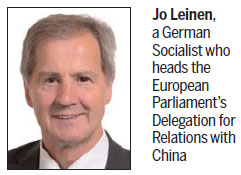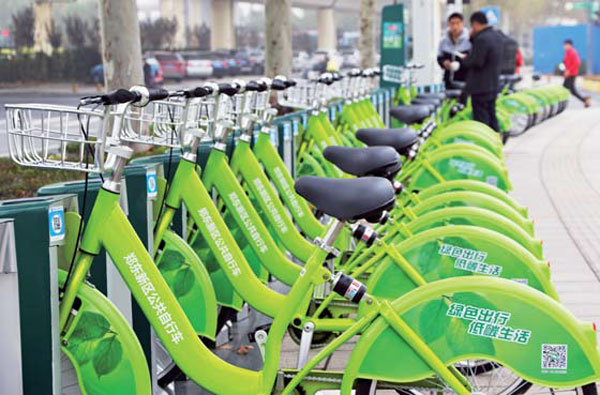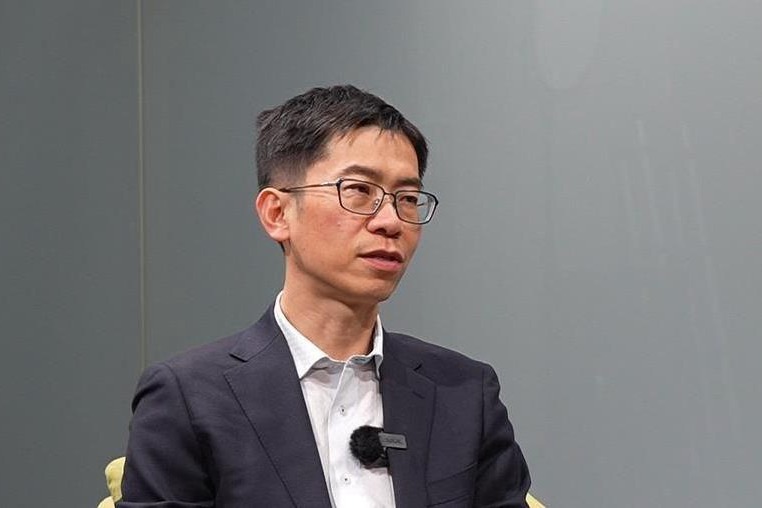China seen as essential ally in climate battle

However, finding enough funding to achieve goals will be one of the biggest problems, EU delegation head says
Most countries, including China, have put forward proposals to do their bit in tackling climate change.
The conference in Paris from Nov 30 to Dec 11 will be the latest attempt by world leaders to forge a deal aimed at averting heat waves, floods and rising seas, the kinds the world has seen many of since the last big climate change talks in Copenhagen failed in 2009.
| An event that promotes reducing carbon emissions and new energy in Shenyang, Liaoning province. Photos Provided to China Daily |
| Public bicycles in Zhengzhou, Henan province, are seen as an environmentally-friendly way of getting around. |

China has emerged as a driving force for a possible deal in Paris. It will arrive at the talks as the world's biggest market for renewable energy, with 433 gigawatts of generating capacity at the end of last year, more than double the second-placed United States.
It is also on course to meet its goal to reduce carbon emissions per unit of economic output by 17 percent by the end of the year from 2010 levels and to derive 11.4 percent of its energy from non-fossil fuels. China has, additionally, promised to cut carbon intensity by 60 percent to 65 percent from 2005 levels by 2030, when it also expects a peak in its carbon emissions.
Jo Leinen, a German Socialist member of the European Parliament who heads the parliament's Delegation for Relations with China, says the summit, which he plans to attend, offers a great opportunity to decarbonize the world.
China has an important role in the summit, he says. The country's decision to reach a peak in its emissions not later than 2030 and its readiness to take part in a five-year review process of the voluntary national emission reduction targets are a clear message to the world, Leinen says.
"Investments in carbon-friendly technologies can help to accelerate the decarbonization of our economies."
He urges Beijing participants in Paris to be "ambitious and decisive" at the summit.
"Without China and without the EU there will be no climate deal, so I hope our diplomats can work together."
The conference can be historic, he says, but any pledges must be followed by concrete steps.
"If in Paris the biggest emitters - the United States and China - turn up with ambitious goals and objectives, I expect Europe to step up its efforts."
The US and China had until recently "been blocking the way", he says, but now it seems they take climate change more seriously.
Leinen, who formerly chaired the assembly's committee on environment, says China and the EU, as two of the world's biggest emitters, must "remain on the front line and broker the best possible deal".
"Paris will test EU diplomacy. A sort of Paris alliance for a legally binding climate deal should be established in order to guarantee success."
Leinen, who has been a member of parliament since 1999, adds: "We in Europe would like to see China hit the high point of its CO2 emissions earlier than 15 years from now as we are aware that the announced peak year of 2030 represents a conservative estimate."

China and the EU are already working together on protecting the environment, specifically on technology transfer, power generation, transport and on building emissions trading scheme pilot projects in China.
But a number of issues are still to be resolved, such as the financing of global climate protection and commitments by individual states.
Leinen says finding the funding is one of the main challenges.
"Who is going to come up with the hundreds of billions of euros that will have to be presented in Paris?"
The 28-strong EU will be responsible for helping developing countries and industrialized ones overcome their differences on climate change, he says.
A lot more trust is needed if plans for financing global climate protection after 2020 are to be established, and he sees financial commitments as crucial in the developing countries' readiness to accept a compromise.
After the disaster of 2009, the EU cannot afford another failure because "mankind is running the risk of losing the race against global warming and to not be able to contain it to a maximum of 2 C".
"China will be a decisive partner in finding a solution that respects the common but differentiated responsibility for climate protection and that includes at the end all countries of the planet with their individual contributions to the common good, which is the atmosphere surrounding the Earth."
Priorities include limiting the rise in global warming to 2 C, speeding up the availability of funds to finance climate mitigation, committing to stop deforestation and degradation and establishing technological mechanisms.
Despite disagreements over how much China should contribute to emissions reductions, the EU and China largely agree on the main issues.
The EU has pledged to cut greenhouse gas emissions by 40 percent by 2030, compared with levels emitted in 1990, and developed countries have agreed to contribute $100 billion every year from 2020 to the Green Climate Fund that helps developing countries to adapt and mitigate climate change.
In addition to its other pledges, China has vowed to boost the share of non-fossil fuels in its energy mix to 20 percent by 2030.
"I appreciate the decision of the Chinese government to introduce an emissions trading system by the year 2017," Leinen says.
"Carbon has to get a price tag, and trading carbon certificates could help to give environmentally friendly investments a clear direction.
"The European Union is happy to cooperate with China in the emission trading policy as well as in the creation of green cities including low-carbon buildings and environmentally friendly transportation systems."
He adds: "China, like the EU, wants a global carbon market and carbon pricing. That is the common understanding between the EU and China. And to our delight China is applying the ETS (emissions trading scheme) in test regions. The EU has a lot of carbon trading knowledge around capacity building. I've witnessed training courses in Beijing, done by EU experts, for the people in China who are setting up the system."
Carbon trading, he believes, is not the only area in which China and the EU can cooperate. Green technology is flourishing in China, particular in the solar sector. China dominates the photo-voltaic modules market, and it has worked with European companies to make complete solar panels.
Leinen, a member of the Progressive Alliance of Socialists and Democrats, says after Paris, more still needs to be done to promote renewable energies. "There is a lot that is done, but there's a lot more that has to be done. We have to de-carbonize our industry and our society. We have to move on from fossil fuels."
Future cooperation should, he says, be enlarged to include digital technologies for creating smart green growth.
Latest polls show that nine out of 10 Europeans think that climate change is a serious problem and Leinen expresses quiet optimism for a positive outcome to the Paris talks.
He also praises the Chinese contribution to tackling global warming, saying, "I'm really happy that the Chinese government is part of the efforts to look for common ways in order to reduce emissions, to show solidarity with the poorer parts of the world, and at the end to stabilize the atmosphere because the eco-system belongs to all of us".
"Despite its continuing transition from a developing country to a developed one, China already has a future strategy for clean industries and clean cities that will benefit the nation and the world."
For China Daily
(China Daily European Weekly 11/27/2015 page9)
Today's Top News
- Japan tempting fate if it interferes in the situation of Taiwan Strait
- Stable trade ties benefit China, US
- Experts advocate increasing scope of BRI to include soft power sectors
- New engine powers cargo drone expansion
- China to boost green industry cooperation
- Manufacturing PMI rises in November
































